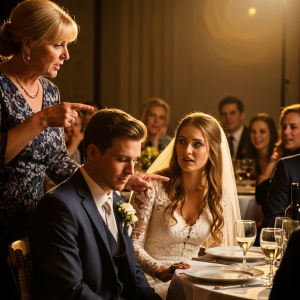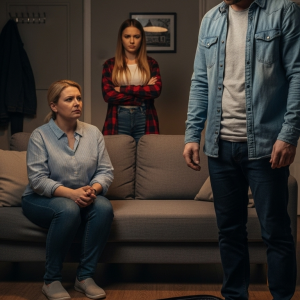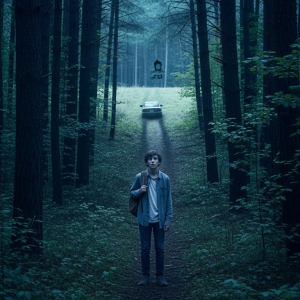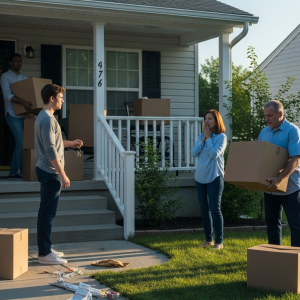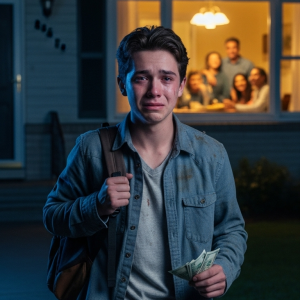For as long as I can remember, I’ve known that my parents loved my older sister, Vicki, more than me. She was the planned child; I was an accident, born just ten months later. The love and support I often felt lacking from my parents, I found in my dad’s parents. Grandma and Grandpa were the anchors of my life.
My problem wasn’t just with my parents; it was with Vicki. She knew she was the favorite and used it as a weapon, making me feel like a stranger in my own home. Our relationship was a perpetual contest where she consistently came out on top.
This dynamic poisoned every part of my childhood. When I made a new group of friends, my parents forced me to include the nerdy, over-enthusiastic Vicki, who quickly alienated them with her awkward attempts to fit in. When they finally told me not to bring her around anymore, Vicki threw a tantrum, and my parents sided with her, demanding I either convince my friends to forgive her or cut them off. I refused, and they gave me the silent treatment for weeks.
The worst incident happened when we were teenagers. Vicki had been spreading lies about me for months, telling our parents I was doing drugs and drinking with my boyfriend. It was a complete fabrication. When I finally yelled at her for the unnecessary drama, she snapped. Out of nowhere, she punched me in the face.
I fell to the ground, my nose bleeding, clutching my face in pain. My parents rushed me to the emergency room, but their primary concern wasn’t for me. All the way there, they pleaded with me not to file a police complaint against Vicki, worried it would ruin her life. When a nurse, seeing my injury, called Child Protective Services, my parents were furious with me, viewing it as a betrayal of family loyalty.
“You’re tearing this family apart by involving outsiders,” my mother cried, as if I were the problem.
In the end, Vicki was let go with a warning. After that day, she stopped speaking to me altogether, which I preferred. My grandparents, horrified by the incident, insisted I come live with them for the remainder of high school. My parents did not protest. In the safety and love of my grandparents’ home, I finally thrived. My parents never once visited or called. At my high school graduation, they showed up to cheer for Vicki, who was in the year above me, but didn’t even congratulate me. It was my grandparents who were there for me.
The years passed. I went to college on a full scholarship, where I met Rob. He was quiet and studious like me, and our friendship blossomed into a love that has been going strong for eight years. His parents treat me like their own daughter. For the first time, I was surrounded by a family that liked me, that didn’t resent me.
Recently, Rob and I got engaged. After I posted the pictures, my parents called me out of the blue. After years of barely speaking, my father straightforwardly asked if he could walk me down the aisle. I was taken aback, but a part of me, the part that still craved a mended relationship, told him yes.
The wedding planning began, and I asked my high school friends—the same girls Vicki had driven away—to be my bridesmaids. We planned a bachelorette party in Vegas. When my parents found out, they were furious.
“Why wasn’t Vicki invited?” my mother demanded.
I explained calmly that after everything that had happened, I didn’t feel comfortable having her at my wedding, let alone my bachelorette party. “She has not even once apologized for everything she put me through,” I told them.
They lost it. They went on about family unity and forgiveness, insisting that relatives would talk. My mother even tried to weaponize my future in-laws, suggesting they would judge me for being so cruel as to exclude my own sister. I laughed and informed her that Rob and his family knew everything and supported my decision. Unwilling to compromise my own well-being for their sake, I stood firm. Vicki was not invited.
Last week, my dad called with their final decision. He had a long, hard think, he said, and he and my mom would no longer be attending the wedding. This also meant he would not be walking me down the aisle.
“Is there a specific reason why?” I asked, my voice hollow.
“Vicki is moving to a new place soon,” he informed me. “And since you’re excluding her, she decided to host a housewarming party that same day. So, we’ll be attending that instead of your wedding.”
I felt a mix of shock and disbelief. The realization that my own sister’s house party took precedence over my wedding was a bitter pill to swallow. I simply told him I understood and hung up.
When I told Rob, he was furious. He was the one who suggested I ask my grandfather. I called my grandparents, my voice choked with emotion.
“You and Grandpa have always been there for me,” I cried. “You’ve been more than just grandparents to me; you’ve been like parents. I can’t imagine anyone else I’d rather have by my side.”
They didn’t hesitate. They told me how honored they would be. In that moment, a profound sense of peace washed over me. With them by my side, I knew I had a family who loved me unconditionally.
My wedding is in two days. Today, I woke up to several missed calls from my dad. I called him back.
“Is it true?” he demanded. “Are your grandparents walking you down the aisle?”
“Yes, that’s true,” I said.
He went off about how disrespectful this was. “We were just trying to teach you a lesson!” he yelled. “We thought that by declining the invitation, you would see the wrong of your ways! We raised you! They have no right to replace me!”
I tried to reason with him, but he wouldn’t listen. I’ve been wondering if I did something wrong, but for my own mental peace, I know I have no choice but to cut them off and enjoy my wedding tomorrow.
My wedding was perfect. With my grandparents by my side, one on each arm, I walked down the aisle. Despite my parents’ absence, I felt a deep sense of joy as I exchanged vows with Rob. I did feel a twinge of sadness during the reception, watching Rob’s family give speeches, but I took solace in knowing I had made the right decision for myself.
As I had planned, I cut off my parents by blocking them everywhere. They don’t deserve an explanation. I don’t know if Vicki ever had a housewarming party, but at this point, I don’t care.
A month later, after returning from our honeymoon, I was sorting through my emails when I found one from Vicki. Curiosity got the better of me, and I opened it. Inside was a lengthy message, expressing regret over our strained relationship and a desire to reconcile.
She acknowledged the mistakes she had made, admitting she had been selfish and immature. She apologized for the pain she had caused and expressed a genuine desire to make amends. She ended the email by pleading with me not to punish our parents by cutting them off, saying that they missed me.
Reading her words, I felt a mix of surprise and skepticism. Part of me wanted to believe she had truly changed, but another part remained guarded. It seemed too good to be true. Regardless of what she wrote, I knew my parents didn’t miss me. If they had, they wouldn’t have treated me this way for years.
I decided not to reply. Forgiveness isn’t something to be rushed. After my marriage, I no longer feel alone. I have a loving husband, supportive friends, and the unwavering love of my grandparents. With their support, I can navigate whatever challenges lie ahead without ever needing Vicki or my parents in my life. I have also booked my first appointment with a therapist to finally address and heal from the wounds of my past.
